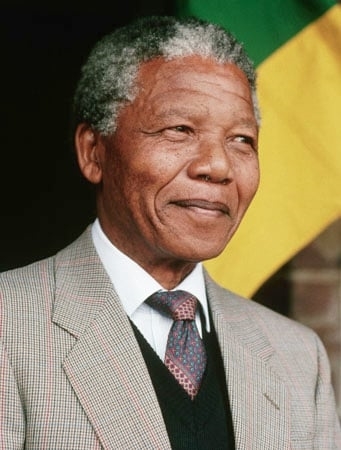 |
| Nelson Rolihlahla Mandela (http://olivosp.wikispaces.com/Nelson+Mandela) |
A strong-willed man wakes up to the now familiar smell of his jail cell. As his feet touch the cold cement, he realizes he may be here for the rest of his life, but he reassures himself, “It always seems impossible until it’s done”("Nelson Mandela Quotes"). Who would think that this aged, grey haired man, jailed for twenty seven years, would one day walk free and unite the country of South Africa.
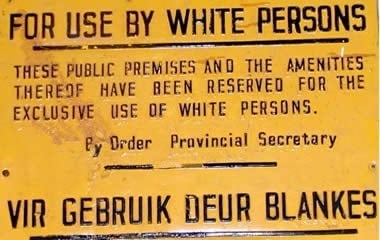 |
| Typical sign segregating blacks and whites (www.history.stir.ac.uk/historical-fields/african/index.php) |
Nelson Mandela was born on July 18, 1918 in a town called Umtata in the Transkei area of South Africa. Mandela grew up as any other young, South African black boy in an environment of poverty and oppression. As a young man he witnessed the white South African government imposing more and more restrictions on an already down trodden, uneducated, black majority. During his years at the University College of Fort Hare and the University of South Africa, where he studied law, he became even more aware of the atrocities and injustices committed in the name of apartheid. In 1944, Mandela joined the National African Congress (ANC) and became an outspoken, activist against the laws of apartheid. "Dangers and difficulties have not deterred us in the past, they will not frighten us now. But we must be prepared for them like men in business who do not waste energy in vain talk and idle action. The way of preparation (for action) lies in our rooting out all impurity and indiscipline from our organization and making it the bright and shining instrument that will cleave its way to freedom"( "No Easy Road to Freedom Speech by Nelson Mandela."). Mandela's charismatic speeches triggered an investigation by the ruling National Party Government, and in 1962 they arrested and charged Mandela with treason. The judge found him guilty, and sentenced him to life in prison. The first eighteen years of his incarceration he spent in Robben Island Prison, often in solitary confinement. Up until his release on February 11, 1990, he was held in Pollsmoor Prison. After his release, Mandela worked tirelessly towards a peaceful, democratic South Africa. He received The Nobel Peace Prize in 1993, and on April 27, 1994, South Africa held its first free election. The people elected Mandela as president. Mandela's strong, inimitable spirit allowed him to not only survive incredible hardships, but transformed him into an international symbol of peace and reconciliation. "I have cherished the ideal of a democratic and free society in which all persons live together in harmony and with equal opportunities. It is an ideal which I hope to live for and to achieve"("Nelson Mandela " I Am Prepared to Die".") He never once wavered in his convictions or his dreams and he has lived to see them all come to pass. Nelson Mandela, known to many as the "Grandfather" of South Africa, embodies all the characteristics of a true hero. In the face of seemingly insurmountable obstacles, he facilitated a peaceful transition to a democratic South Africa.
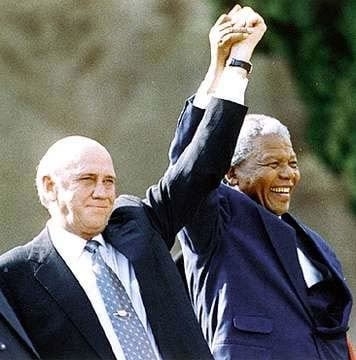 |
| Hand over of power from De Klerk to Mandela. (www.negroartist.com/) |
Mandela personifies the way in which the human spirit can triumph over hate and evil by embracing peace and reconciliation, in the face of seemingly insurmountable odds. After his release from more than two decades of incarceration, many forces pressurized Mandela to take a hard, violent, vengeful approach to a free South Africa: "Over the objections of more radical ANC members, he urged conciliation (closer relations) with South African President de Klerk and other government leaders. He believed such an approach would enable blacks to obtain political power peacefully"(Saunders) Even though he had every reason to be filled with hate, his peace loving nature drove him to tirelessly seek a non-violent transition to a democratic government. Mandela realized that the path of peace was the only way that his people would truly be victorious and reap the benefits of freedom and an equal society. Even though initially Mandela took part in the armed struggle, at the first opportunity, he chose to negotiate peacefully with his previously relentless persecutors: "However, the reversal in policy to that of reconciliation, which Mandela pursued upon his release in 1990, facilitated a peaceful transition to fully representative democracy in South Africa"("Mandela, Nelson"). The armed struggle against the oppressing minority power, always went against Mandela's true nature. He dreamed of what a free, democratic society should be, and he ultimately proved that the path of peace, negotiation, and reconciliation led to the realization of this dream. It is not only his peace loving nature that makes him a hero, but his relentless belief in a free society and his unrelenting stance against the path of violence and bloodshed to achieve such a society.
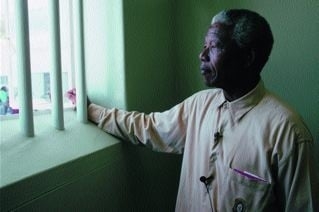 |
| Nelson Mandela in his jail cell. (http://stevecotler.com/) |
Courage has many forms, and Mandela demonstrated physical, mental, spiritual, and emotional courage throughout his hard life. Even in earlier years he stepped up into lead roles and defied the ruling powers concerning paramount issues: "He became the commander-in-chief of Umkhonto we Sizwe (Spear of the Nation), an organization committed to an armed struggle against apartheid"( Saunders). He never considered his personal safety or well being but always courageously put his people and his true beliefs first. His courage never failed him as he continued to lead, inspire, and stand against unfair injustices perpetrated against him and his people. While the whole world watched, the oppressive government convicted him of treason but yet he bravely stood up, stated what he believed in, and declared that he was willing to die for his convictions: "In the glare of worldwide publicity at the end of the trial, he delivered a dramatic final statement from the dock, concluding that 'the ideal of a democratic and free society … is an ideal for which I am prepared to die'”( International Encyclopedia of the Social Sciences). This amount of fearless dedication to a righteous cause makes Mandela a true, courageous hero. He sacrificed everything to ensure that his dream of a free, equal South Africa would come to pass. From his first appearance as a young activist lawyer, through his treason conviction and incarceration, until the day his people inaugurated him as South Africa's first democratic president, Mandela exhibited a steadfast courage.
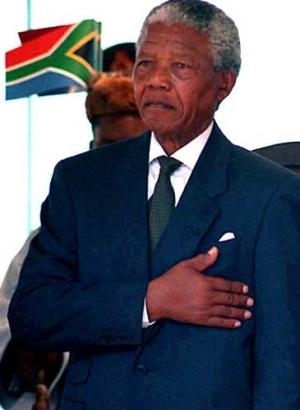 |
| First democratically elected president by universal sufferage of South Africa (http://www.independent.co.uk/arts-entertainment/) |
As the grey-haired, dignified man finally stepped out of his cell to freedom, his own words, spoken twenty seven-years earlier, reverberated through his mind. "During my lifetime I have dedicated myself to this struggle of the African people. I have fought against white domination, and I have fought against black domination. I have cherished the ideal of a democratic and free society in which all persons live together in harmony and with equal opportunities. It is an ideal which I hope to live for and to achieve. But if needs be, it is an ideal for which I am prepared to die"("Nelson Mandela " I Am Prepared to Die"."). These powerful words of Mandela echoed through decades, and inspired a generation of people to hope and never give up on what they believe in. He achieved what no one thought possible- a negotiated, peaceful transition to a democratic government. Throughout his life his peace loving nature kept him focused and determined to pursue a non- violent path to freedom. "For to be free is not merely to cast off one's chains, but to live in a way that respects and enhances the freedom of others”( "Nelson Mandela Quotes."). He unselfishly sacrificed himself, and willingly suffered for the good of all South African people. His courageous spirit led him to stand up against the overwhelming, ruling forces, and kept him from crumbling under the tremendous hardships he endured. Nelson Mandela inspired a nation to achieve a wonderful, positive goal, and ultimately that is the true mark of a hero. To think of all his achievements, and realize what one truly good man can do, is an inspiration to all people. The streets of South Africa could so easily have run with the blood of its people, but the small boy who grew up in Umtata, propelled an entire nation along a peaceful path to a place where "all persons live together in harmony and with equal opportunities"("Nelson Mandela" I Am Prepared to Die".").
"International Encyclopedia of the Social Sciences." Ed. William A. Darity, Jr.. Vol. 4. 2nd ed. Detroit: Macmillan Reference USA, 2008. p580-581.
"Mandela, Nelson." New World Encyclopedia n. pag. Web. 13 Dec 2010. <http://www.newworldencyclopedia.org/entry/Nelson_Mandela>.
"Nelson Mandela " I Am Prepared to Die"." The History Place. N.p., n.d. Web. 6 Jan 2011. <http://www.historyplace.com/speeches/mandela.htm>.
"Nelson Mandela Quotes." BrainyQuote. N.p., n.d. Web. 6 Jan 2011. <http://www.brainyquote.com/quotes/authors/n/nelson_mandela.html>.
"No Easy Road to Freedom speech by Nelson Mandela." famousquotes. N.p., n.d. Web. 6 Jan 2011. <http://www.famousquotes.me.uk/speeches/Nelson_Mandela/1.htm>.
Saunders, Christopher. "Mandela, Nelson." World Book Advanced. World Book, 2010. Web. 9 Dec. 2010.
Page created on 7/31/2012 12:00:00 AM
Last edited 1/6/2017 9:53:02 PM
